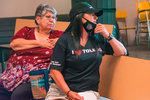




Cowlitz Indian Tribal Council Chair Patty Kinswa-Gaiser wants Toledo’s “Indians” mascot to stay. The school district has been home of the “Indians” for 100 years, including when Kinswa-Gaiser was a student.
“I don’t think Toledo Indians is a harmful name. I’ve been an Indian all my life. So have my ancestors, and they lived here,” Kinswa-Gaiser said Tuesday, sitting in Toledo High School’s commons.
But her daughter, Suzanne Donaldson, wants the name gone. She says plenty of tribal members find the moniker offensive.
“I’m a different generation. And I’m of modern times, and it’s definitely inappropriate,” Donaldson said, adding that just last week she was called “Sacagawea.”
“It’s these types of things that make people think it’s OK to speak to us and treat us this way,” Donaldson said of the school’s mascot. “It’s not OK.”
Donaldson’s mother recalls her school-aged years, when she spent time in an Onalaska principal’s office after defending her younger sister against racist taunts. The way Donaldson sees it, it’s ironic that her mother still supports the “Indians” name after that.
“My mom and I, we disagree, but we can have a respectful conversation,” Donaldson said. “And that’s important.”
The generational divide emerged Tuesday as Toledo School District convened its first focus group to discuss the schools’ rebranding. Superintendent Chris Rust invited Cowlitz tribal members and other Indigenous people to discuss the top 20 mascots that resulted from what he deemed the “mascot primary.” Of the hundreds of suggestions submitted by the community, Rust preemptively removed all the suggestions that read “Indians.”
But while Rust introduces the community to new mascot ideas, he’s also holding out hope that the state might exempt Toledo from the new state law that prompted the rebranding to begin with. The law largely prohibits the “inappropriate use” of Native American mascots and imagery in public schools. Certain exceptions are made for school districts near tribal trust lands. The bill, as written, doesn’t exempt Toledo, but Rust hopes state officials will give the OK since the Cowlitz Indian Tribe is headquartered nearby in Longview.
In that case, the district would need the approval of the tribe to continue using its mascot.
The state “understands our predicament,” Rust said, and may end up providing approval. During the focus group, Rust described the school’s rebranding as an “unintended consequence” of the new state law, citing a positive relationship between the district and the Cowlitz Indian Tribe.
If the state does grant an exception, it would be a relief to Kinswa-Gaiser, as well as Jim Wallace, a member of the Hoopa Valley Tribe, whose family owns Toledo’s Gee Cee’s Truck Stop.
Generations of Wallace’s family have gone through the Toledo School District. On Tuesday, he said changing the mascot would be “a slap in the face to the Native community.”
Wallace said he agrees with the state law, and like Kinswa-Gaiser and Donaldson thinks the district’s older relics — such as the “Chief Wahoo” caricature and older retired mascot costumes — are offensive. But he described Toledo as caught in the middle, forced to give up its name despite support from some Indigenous community members.
If the “Indians” name gets to stay, it would also be a win for people such as Loren Bowen, a non-Indigenous community member whose family has also gone through the district for generations.
Bowen sported a baseball cap featuring the “Chief Wahoo logo,” a ripoff of the Cleveland Indians’ image, and one Rust called racist. Bowen said he got it from the school.
“I think it should be left just like this,” Bowen said of the district’s masot. “What’s the matter with that? Can somebody explain?”
While participants disagreed on the mascot issue, there was consensus around the fact that the Cowlitz Indian Tribe has played a significant role in the school district. David Ike, a celebrated Cowlitz tribal member who Kinswa-Gaiser and Donaldson both call “uncle” is memorialized in the high school. Kinswa-Gaiser recalls him boarding school buses, offering words of encouragement to student-athletes in both English and the Cowlitz language.
Wallace and Kinswa-Gaiser say Ike and other elders who have since died would not want the “Indians” mascot to be scrapped. Donaldson isn’t so sure.
The new state law received support from tribal members from across the state this year, as well as from the Office of Superintendent of Public Instruction. The bill itself points to the United States Commission on Civil Rights, which has recommended ending the practice for years, saying the in-school stereotypes are “disturbing” and can contribute to a “racially hostile educational environment.”
Other supporters pointed to the American Psychological Association’s finding that such mascots are detrimental to young Indigenous people’s development and self-esteem.
Ultimately, the bill received bipartisan support, with all 19th and 20th Legislative District lawmakers voting in favor.
But that bipartisan support in Olympia doesn’t quell local divisions.
Before dispersing, Donaldson — whose shirt read “I Heart Toledo” and “I Am Not Your Mascot” — took off her Cowlitz Indian Tribe hat, giving it to Bowen. In exchange, she asked Bowen to give up his “Chief Wahoo” hat. He declined.
“I don’t know if I want to give it up,” Bowen said.
At the end of Wednesday’s focus group in Toledo, the handful of participants threw their support behind the “Riverhawks” name — the winner of the “mascot primary.”